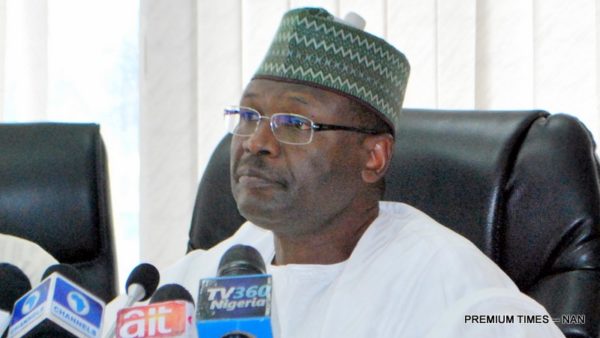This post has already been read 1636 times!
In this piece, OLALEKAN ADETAYO, looks at the major issues, including violence, vote-buying and litigation that are posing danger to the successful conduct of Nigeria’s forthcoming general elections
On January 8, violence erupted during the inauguration of the campaign of the All Progressives Congress at the Sky Power Ground, Oba Akinjobi Road, Ikeja, Lagos, as hoodlums invaded the venue and engaged in a supremacy battle.
Among those who reportedly sustained gunshot injuries during the clash were the Group Political Editor of The Nation, Emmanuel Oladesu; a correspondent with New Telegraph, Temitope Ogunbanke; and a cameraman with Ibile Television, Abiodun Yusuf. A leader of the National Union of Road Transport Workers, Musiliu Akinsanya, aka MC Oluomo, was also stabbed during the clash.
A few days later, one person was killed and about 10 vehicles were destroyed during an attack on the convoy of the governorship candidate of the APC in Taraba State, Alhaji Sani Danladi. The incident occurred when Danladi, who was on a campaign tour of the Southern zone of the state was on his way to Ibi Local Government Area and his convoy ran into some youths who barricaded the Ibi roundabout area of Wukari.
These are just two among the numerous cases of violence that have been recorded in Nigeria since the process leading to the nation’s general elections scheduled for February 16 and March 2 started. No state or region is spared of this needless bloodletting from the North to South. When party members are not taking up arms against one another over party tickets, they are engaging members of other parties in bloody clashes.
Violent electioneering is not new in Nigeria. Tension always rises among political parties in election years. This probably was part of what gave birth to what is now known as the National Peace Committee headed by a former military ruler, Gen. Abdusalami Abubakar (retd.).
Despite this bold step, however, violence persists in the polity and it remains a major threat to the success of the general elections if it continues this way. Elections may be cancelled and thereafter declared inconclusive in constituencies where violence is recorded during elections.
Vote-buying
What has come to be known as vote-buying has also crept into the nation’s electoral process, thereby posing another major threat to the nation’s democracy. This is a process through which politicians offer money to voters with the sole aim of influencing their choice of candidates at the poll. All politicians seem to agree that this development is not good enough for the electoral process, but the problem remains that none of them will admit that he or she is a culprit.
Counter-accusations
The nation is also daily being fed with accusations and counter-accusations on alleged plan to scuttle the electoral process. Opposition political parties have at many times made grievous allegations against the Federal Government and even the electoral body. They have accused the government of planning to clamp down on leading opposition figures and rights activists with a view to silencing them ahead of the elections. They have examples to back up their claim. They have also at different times accused INEC of planning to engage beneficiaries of government’s Social Investment Programme, N-Power, as ad hoc staff during elections. All these have been denied by those concerned.
The government also seems to have seen the need to join the fray. Last week, it accused members of the opposition of allegedly arming hoodlums with the aim of disrupting the elections.
All these and more have been contributing in no small way to the increased tension the nation is witnessing ahead of the election. Leaders of thought as well traditional and religious leaders have been intervening in order to ensure a peaceful process. Unfortunately, many still see such interventions from the perspective of partisanship, depending on the camp they belong to.
It got to a point that friends of the nation could no longer fold their arms and watch things go wrong. The United States and the United Kingdom have since come out strongly on the matter. They threatened to impose visa restriction on anybody found to be interfering in the process. This is an intervention that appears to have gone down well with opposition parties and the Federal Government.
Litigation
Violence, vote-buying, counter-accusations will clearly not do the electoral process any good. Apart from these challenges, there is also the key issue of litigation. The rancorous congresses held by most political parties had attracted court cases to themselves and INEC, therefore serving as a clog in the wheel of the commission’s preparation for elections.
According to an insider in the electoral body, there are 639 cases in court in respect of the last congresses. Prominent on the list of states where INEC is waiting on the court to decide before final decisions can be taken on its preparations include Rivers and Zamfara states where lower courts have ruled that the APC’s logo should not appear on the ballot paper.
Fake news
Another major challenge to the conduct of the election is fake news. The 2019 general election is described as youths’ election in the sense that more youths are getting involved in the electoral process. Since youths are more involved, it is expected that the use of social media will play a prominent role in the election. With the rate at which fake news spreads like wildfire ahead of the elections, it is expected that more of such falsehood will still be dished out during the elections, therefore causing unnecessary panic among citizens.
As the nation gets closer to the general elections, therefore, one will just hope that political gladiators will learn from the saying that when brothers fight to death, a stranger inherits their father’s estate.
[Punch]



